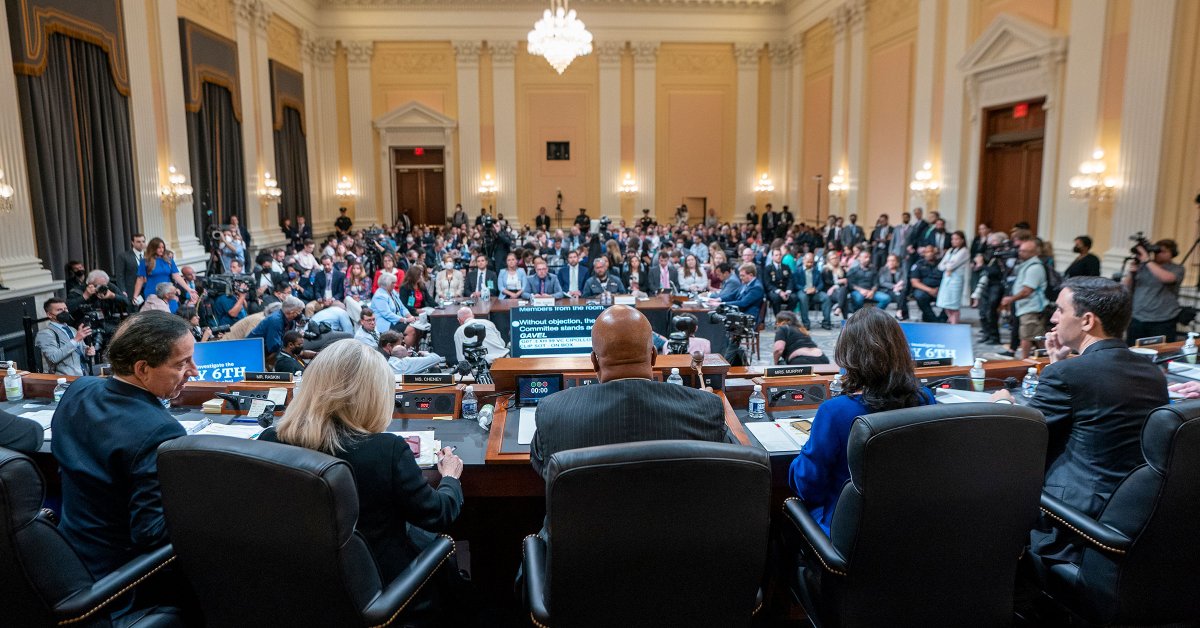The Jan. 6 Committee has always been clear about its two main goals. First, it wanted to show that former President Donald Trump was the main culprit behind the violent attack on the U.S. Capitol, and over the course of its hearings the committee proved surprisingly effective at making that case. “The central cause of Jan. 6 was one man, former President Donald Trump,” the panel wrote in its final report published Thursday night. “None of the events of Jan. 6 would have happened without him.” Even top Republicans agree the Committee made that case convincingly.
Much harder to accomplish is the committee’s second goal: ensuring nothing like Jan. 6, 2021 ever happens again.
The committee’s final report is more than 800 pages long and covers all of the House committee’s findings, based on some 1,000 interviews and hundreds of thousands of documents. The final section focuses on prescriptions for fending off similar attempts to overturn elections in the future. Here are five:
Reform the Electoral Count Act
The Electoral Count Act is a 19th Century law that Trump and his allies tried to exploit to prevent the peaceful transfer of power to Joe Biden. The act does not give the vice president the authority to unilaterally reject the election results. But the lawyer John Eastman told Trump he could use the law to convince then-Vice President Mike Pence, to nullify Biden’s win on Jan. 6.
The Jan. 6 committee, tapping into broad support among legal scholars and members of both parties in Washington, urged Congress to make clear that attempts like Eastman’s were illegal, and already that recommendation has been acted on.
On Friday, Congress passed a $1.7 trillion end-of-the-year spending bill that includes the Electoral Count Reform Act, a bipartisan Senate bill that’s designed to prevent a repeat of Jan. 6. It now heads to the desk of President Biden’s desk. The text makes clear that the vice president’s role in overseeing the Electoral College count is purely ceremonial, and it raises the threshold for members of Congress to raise objections to state results.
Prosecute those responsible for the attack
Another committee recommendation urges the Justice Department to prosecute those who ignited and aided the attack, including Trump. It comes three days after the nine-member panel voted unanimously to refer Trump and four others to the Justice Department for prosecution on four charges: attempt to obstruct an official proceeding, conspiracy to defraud the U.S. government, conspiracy to make false statements, and incitement of insurrection. The referrals have no legal weight and don’t force DOJ to act. No congressional committee has ever before made such a declaration against a former president.
Prevent Trump and other insurrectionists from holding office
The committee recommends invoking the 14th Amendment to stop anyone who engaged in the insurrection, particularly Trump, from holding state or federal office. To do that, the committee wants congressional committees of jurisdiction to consider “creating a formal mechanism” to bar those individuals who participated in the Jan. 6 coup attempt from gaining the reins of government power.
The constitutional provision says that anyone who has “engaged in an insurrection” or given “aid or comfort to the enemies of the Constitution” can be disqualified from holding office at the federal or state level.
The House panel also called on the federal government to conduct a “whole-of-government” strategy to combat violent extremism. The committee wants federal law enforcement and intelligence agencies to review their intelligence sharing protocols to ensure they can respond to emerging threats—especially against legislatures, government bodies, and minority groups—promptly.
Toughen the penalties for those who try to sabotage elections
The committee’s final report urges harsher punishment for anyone who tries to meddle with American elections. It recommends stiffening penalties for anyone who threatens election workers or attempts to interfere with the Congressional certification of the electoral college vote.
Increase the power of Congressional investigators
The Jan. 6 Committee also recommends beefing up the House of Representatives’ subpoena powers. While many in Trump’s inner orbit provided powerful testimony for the panel’s probe, several of the former president’s closest allies spurned their subpoenas and faced no consequences, such as former White House chief of staff Mark Meadows and Republican members of Congress Kevin McCarthy and Jim Jordan.
Former federal prosecutors say that such a change would give Congress a greater ability to get at the truth, not just in this investigation but in future ones. “There’s no difference in legal compulsion between a congressional [subpoena] and a DOJ one,” says Harry Litman, a former U.S. attorney, “but you have people cynically defy them knowing that the committee would only go for two years and time would run out. And so the committee was left almost powerless to use its subpoena powers.”
The Jan. 6 committee’s final act
The recommendations put forth by the Jan. 6 committee were not exhaustive. The panel encouraged legislators to consider reforms to the Insurrection Act, which Trump weighed invoking to seize election machines after the election, without offering any specifics. It also called for the Congress to “evaluate policies of media companies that have had the effect of radicalizing their consumers, including by provoking people to attack their own country.” And lastly, the report pushed for increased oversight of the Capitol Police, to ensure adequate “planning, training, equipping, and intelligence processes.”
The report is the committee’s final act before dissolving ahead of the new Congress, when Republicans take control of the House.
The tome is broken down into eight chapters that cover the major themes addressed during the committee’s investigative hearings held over the summer and fall. They include narrative accounts of how several top administration officials told Trump that his claims of voter fraud were baseless; how Trump pressured Vice President Pence and state election officials to nullify Biden’s victory; how he tried to corrupt the Justice Department to sow doubt in the election outcome; and his unwillingness to call off his mob of supporters who stormed the Capitol.
Trump has repeatedly dismissed the Jan. 6 committee hearings—which drew more than 20 million prime-time viewers over the course of the spring and summer—as a “partisan witch hunt.” On Friday morning, he remained defiant in the face of a damning report, while still promulgating the misinformation that the Jan. 6 Committee argued led to the deadly attack.
“The Government of the United States changed our Election Result, and it just doesn’t get any worse than that,” he posted on his social media platform Truth Social on Friday morning. “Just look at the damage that’s been done to our Country, and the World, in the last two years—it’s incalculable. TRUMP WON!!!”
More Must-Reads From TIME



